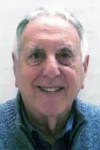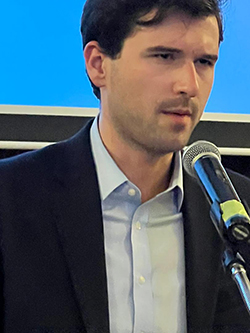By Donald H. Harrison


SAN DIEGO – Court suits have been the most effective tactic so far in the effort to staunch antisemitic encampments on university campuses, freelance journalist Zach Kessel declared Monday evening, Sept. 23, in a speech sponsored by the United Synagogue of Conservative Judaism.
While other tactics such as legislative hearings, donors withdrawing their donations to universities, and discrimination complaints to the U.S. Department of Education all have drawn needed attention to the problem, Kessel said litigating the matter on First Amendment grounds has proven more successful.
During a lecture at Tifereth Israel Synagogue, Kessel pointed to a decision by U.S. District Court Judge Mark Scarsi in Los Angeles last month that said, in essence, if UCLA wouldn’t guarantee the right of Jewish students to access the library, classrooms, and event space – all of which were blockaded last semester by anti-Israel forces – then UCLA would be forbidden from holding classes for any students.
“If Jewish students cannot access the same resources that non-Jewish students can access, they were violating their First Amendment Rights to freedom of religion,” summarized Kessel, who covered nationwide campus tumult for the National Review, self-described as “a leading conservative magazine.”
Kessel praised such organizations as StandWithUs, the Louis D. Brandeis Center for Human Rights Under Law, and the Deborah Project for initiating lawsuits against universities that succumb to anti-Israel forces, which he said were being fostered by the ideologies of the Muslim Brotherhood, Soviet-style propaganda, post-colonial studies programs, and “identitarism,” in which Jews are seen as White oppressors.
Kessel said other tactics against antisemitism are helpful in alerting the general public to the problems, but not as effective as lawsuits.
For example, “I was heartened to see a lot of big donors pulling money but when you think about these schools –the amount of money they have in their endowments, the billions of dollars that they have in their endowments, and the amount of federal funding that they get – it means that it doesn’t actually matter if the big donors pull their money. It just means that they won’t have their name on a building.”
Federal remedies are harder to put into effect, Kessel said. “There is a massive bureaucracy that you have to deal with,” he explained. “You have a lot of Department of Education officials who have not been following though on civil rights claims that Jewish students have made against the universities.”
“The Department of Education is actually sued right now for failing to follow through on a lot of these claims,” Kessel added. “Regardless of partisan affiliation, the mechanisms of the federal government don’t work quickly enough to actually deal with this problem. They rely on the individual bureaucrats operating in good faith and actually wanting to solve this. There is too much that can go wrong to rely on that.”
The congressional hearings which initially put the presidents of Harvard, Massachusetts Institute of Technology, and the University of Pennsylvania on the spot – with none of the presidents willing to say that calling for the genocide of the Jewish people crossed the boundaries of free speech – “were helpful in getting the word out about the spinelessness of the administrators,” Kessel said.
“I don’t think that they (the presidents) are antisemites; I just think that they are afraid of the radicals who are really running the show,” he said. “I mean the inmates are running the asylum on a lot of these campuses. But it is great that it exposed how little control they actually have over their universities.”
*
Donald H. Harrison is publisher and editor of San Diego Jewish World.
I was unable to attend the event so huge thank you for this excellent summary and sharing such important information.